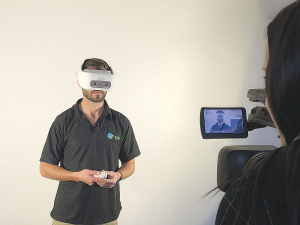NZ winegrowers advance vineyard biosecurity in 2025
The year was marked by “progress, collaboration and reflection” in biosecurity, says New Zealand Winegrowers Biosecurity Advisor Jim Herdman.
 ECO FRIENDLY: Reuben Turner inspects biosecurity training provider IVS’s new virtual shipping container.
ECO FRIENDLY: Reuben Turner inspects biosecurity training provider IVS’s new virtual shipping container.
Cutting edge technology designed to simulate biosecurity threats has emerged from the collaboration of two Hamilton companies.
A pioneering virtual reality shipping container packed with simulated biosecurity risk scenarios is helping preserve New Zealand’s ecosystem and way of living.
Independent Verification Services (IVS) in Hamilton has launched a new virtual reality (VR) simulation built by Hamilton software specialist Company-X. The Ministry of Primary Industries has approved the technology to be used in biosecurity refresher training.
The project was led by Company-X augmented and virtual reality specialist Lance Bauerfeind, with project manager Dilan Prasad and augmented and virtual reality generalist Wonkee Kim.
Using virtual reality to assess frontline staff dealing with imported goods was a New Zealand first, said IVS chief executive Peter Webb.
“It’s the first training course that is not undertaken in a classroom, using a written examination-style assessment. Instead, it offers an online course with a virtual reality assessment that lets trainees demonstrate their practical knowledge and skills.”
The technology provides trainees with a realistic environment to properly assess their abilities to detect and respond to biosecurity threats such as foreign insects and vegetation.
A wireless virtual reality headset allows the person to walk around the simulated container externally and internally, in the same way that they would in the real world.
“The virtual reality tool is the closest and more realistic assessment of skills,” Webb said. “It replicates real-life situations that may be encountered on the job.
“We randomise all the different things that can happen, like poisonous spiders,” Bauerfeind said.
“We can trick head movements so we know where they are looking.”
“We chose to work with the team at Company-X due to their experience and capability. The fact that they are based here in the Waikato, was also a bonus,” Webb said.
The project, Webb said, was the first step in what could be a transformational journey for the biosecurity industry in New Zealand. It uses virtual reality to train staff dealing with biosecurity contamination immediately post-border in the most realistic way.
“This technology has the potential to be used to educate all New Zealanders to identify and respond to biosecurity risks,” he said.
“IVS believes virtual reality could be instrumental to achieving a biosecurity team of 4.7 million, where all New Zealanders are aware of the importance of biosecurity and involved in pest and disease management, as set out in the Government’s Biosecurity 2025 strategy.
Controls on the movement of fruit and vegetables in the Auckland suburb of Mt Roskill have been lifted.
Fonterra farmer shareholders and unit holders are in line for another payment in April.
Farmers are being encouraged to take a closer look at the refrigerants running inside their on-farm systems, as international and domestic pressure continues to build on high global warming potential (GWP) 400-series refrigerants.
As expected, Fonterra has lifted its 2025-26 forecast farmgate milk price mid-point to $9.50/kgMS.
Bovonic says a return on investment study has found its automated mastitis detection technology, QuadSense, is delivering financial, labour, and animal-health benefits on New Zealand dairy farms worth an estimated $29,547 per season.
Pāmu has welcomed ten new apprentices into its 2026 intake, marking the second year of a scheme designed to equip the next generation of farmers with the skills, knowledge, and experience needed for a thriving career in agriculture.
OPINION: Staying with politics, with less than nine months to go before the general elections, there’s confusion in the Labour…
OPINION: Winston Peters' tirade against the free trade deal stitched with India may not be all political posturing by the…